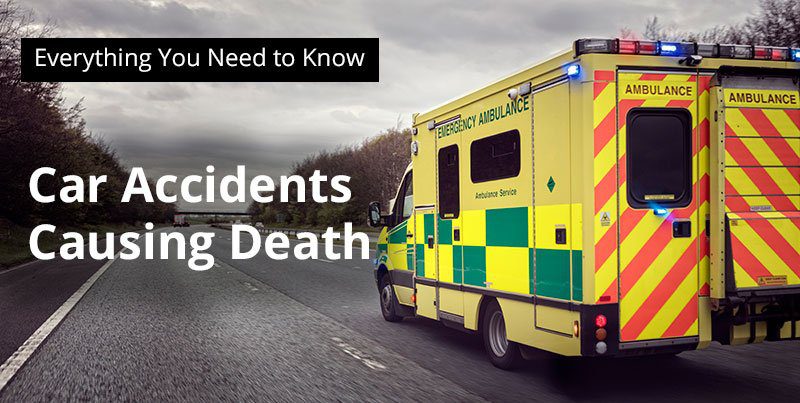Each year, millions of people around the country die after being involved in an accident. In fact, it’s one of the leading causes of accidental death in the United States.
As common as it is, though, many of us don’t know exactly what happens if someone dies in a car accident.
In this post, we’re going to go over how families can deal with the legal and financial ramifications of a traffic accident causing death.
How Often Does Someone Die in a Car Wreck?
Car accidents kill around 1.25 million people each year, with many more suffering from non-life-threatening injuries. The National Highway Traffic Administration estimates that a wreck occurs at least once every minute of the day. While some of these are minor, others can result in fatalities.
Some victims die at the scene of a crash in what’s known as a sudden death accident, often the result of a high-speed impact or blunt force trauma.
In an eventual death accident, the victim lives long enough to reach a hospital. However, due to extensive physical damage, their body is unable to cope. They may pass away in the ambulance or at a medical facility.
These deaths also count as road fatality victims.Â
The main reason that road deaths are so common is that we spend time in our cars just about every day.
For most of us, it’s the most dangerous thing that we do regularly. And yet, many people still violate the road rules when driving, which is often the cause of fatal accidents.
The Most Common Causes of Road Accidents
Many people wonder: how do people die in car wrecks?
There are countless ways that drivers find themselves getting into a car accident resulting in death. Sometimes it’s just a minor fender bender, while other times, their car might get totaled.
However, most drivers would agree that the most concerning accidents are those with the likelihood to end in fatality.
While most people think of drugs and alcohol as the leading cause of fatal accidents, speeding actually takes more lives than any other road infraction. Even just going a few miles over the speed limit can make it more difficult to control your car, especially in less-than-ideal conditions.
Distracted or careless driving is another common cause of fatalities, especially in the cell phone era. Drivers who take their eyes off the road to text or are distracted by a phone conversation are less focused on their surroundings and more likely to hit something, or someone, by accident.
Drowsy drivers are also a major cause for concern in the United States.
Many people underestimate the dangers of driving when sleep deprived. Someone who’s just finished a twelve-hour shift doesn’t have the mental faculties or reaction times to drive safely.
In fact, many experts consider drowsy driving to be just as dangerous as driving under the influence.
Many fatal accidents occur because people fail to follow the basic rules of the road. If someone fails to read the road signs around them, they may end up hitting whoever has the right of way.
Failure to obey stop and yield signs are two common causes of fatal accidents on the road.
It’s best to be aware of what commonly causes fatal accidents to avoid making the same mistakes yourself. When driving, always keep in mind that what you’re doing is potentially dangerous.
Make sure that you stay alert and follow the rules of the road at all times.
Does the Person That Caused a Vehicle Crash Where Someone Dies Go to Jail?
It’s a sad fact that accidents happen all the time, and it can be difficult for grieving families to process, especially if they don’t already know what happens if someone dies in a car accident.
Often, they struggle to move through the legal proceedings that follow a loved one’s accidental death. Many look for someone to place at fault; however, not all drivers face criminal charges after a fatal accident.
Drivers don’t often face criminal charges when a fatal accident occurs because of factors outside of their control, such as poor road conditions or unexpected mechanical failures. Drivers also aren’t held responsible for what is known as an “Act of God,” which includes natural occurrences such as hail, floods, tornadoes, and more.
If an accident results from careless or reckless driving, it may warrant a vehicular manslaughter charge.
Ultimately, your local district attorney decides whether a driver is criminally liable for a fatal accident. They consider a variety of factors, particularly regarding the driver’s conduct before the accident.
In most places, a driver who was under the influence of drugs, alcohol, or other substances at the time of the accident will be held criminally responsible for any fatalities. Even sober drivers can get criminal charges if they fail to follow the rules of the road.
Infractions such as speeding, failing to yield, and more can lead to a driver being held liable for a death.
After an accident, police and insurance companies both conduct a thorough investigation of the accident. They need to get an idea of what happened and whether or not anyone is at fault. Police will interview occupants of each vehicle as well as any bystanders who may have witnessed the crash.
The police will also investigate the scene for more details about the accident. They’ll look at the damage to each vehicle, skid marks or signs of collision along the road, and any signs of minor injuries to occupants. They may also order blood tests, check nearby security cameras, and even look into past driving records.
The police report plays a major role in whether or not a driver is deemed innocent or guilty in a fatal accident. If a driver is found criminally liable, they may end up serving prison time. The sentence can last from months to years. The length depends on factors such as the nature of the charges, the severity, and the state laws where the accident occurred.
Does the Insurance Company Pay for Wrongful Death From a Car Accident?
After an accidental road death, many families struggle to pay medical and repair bills, investigative fees, funeral costs, and more.
In some cases, they may be able to get financial assistance by filing a wrongful death lawsuit against the guilty party. The claim must be filed by the deceased’s personal representative, such as a spouse, children, parents, blood relatives, or close family friends.
A wrongful death lawsuit may recognize both economic and non-economic damages in the final settlement.
Most of the time, the liable party will be required to pay at least a portion of economic damages such as medical expenses, burial costs, and lost wages.
In some cases, non-economic damages such as mental suffering and decreased quality of life are also considered. If the driver was behaving recklessly, they might also face punitive damages.
Even if no one gets arrested, a family may be able to seek monetary compensation.
However, whether or not they have a case depends on who is liable. The deceased’s family or dependents need to know who to file a lawsuit against if they want to see any results.
Police reports can help determine liability, but plenty of other evidence may also come into play in court. Families should hire a wrongful death lawyer to go over all of the necessary details to build an airtight case. A good lawyer can identify parties guilty for fatalities as well as injuries and other damages.
Liability isn’t necessarily limited to the driver of a vehicle involved in an accident. If the driver doesn’t own the car involved, the true owner may be partially at fault. The car manufacturer may be held responsible if the accident is due to mechanical failure.
If a poorly maintained road causes an accident, the local government may be held liable. Businesses that send out drivers on company time can also be held responsible if an employee or company vehicle is involved in a wreck.
In some cases, victims can file an insurance claim for death from a car accident. It’s important to remember that not all insurance plans are created equal, however. While one may pay all damages involved, others will only pay out a small fraction.
Most insurance policies provide a death benefit that pays out a set amount to victims of a fatal accident.
Families may be able to apply for a death benefit in certain situations as long as the deceased is present on the insurance policy.
You may also be able to file with the responsible party’s insurance for compensation. If your vehicle was damaged or a passenger was injured, their policy may cover up to a certain amount.
However, while insurance is mandatory, it’s important not to rely on another person’s plan to cover your expenses after an accident. You should ensure that your own insurance has a payout policy in the event of accidental death.
Avoiding Fatal Wrecks
You don’t always need to worry about what happens when someone is killed in a car accident. While you can’t control what others do on the road, you can take precautions to reduce your own risk of getting into a wreck.
Defensive driving is one of the best ways to avoid a wreck with an impaired driver. You should always be focused, alert, and aware of your surroundings when driving.
It may be a good idea to brush up on the road rules in your state every few years to give yourself a refresher course on safe driving. If you plan on visiting any other states or countries, always make sure to familiarize yourself with their road laws to avoid accidents abroad.
If you do ever get into an accident, you can take steps to protect everyone in your car from serious injury. The driver, passenger, and anyone else riding in the vehicle should all be wearing seat belts for the entire ride. Children younger than 13 should ride in an age-appropriate car seat for their own safety.
It’s also a good idea for everyone to sit upright, with their legs down and arms inside the vehicle. Cars are crash tested to protect people sitting in this position; if your legs are up or arms are out, airbags, compacting metal, and glass shards may have a higher risk of injuring you.
As you drive, remember to keep a safe distance between your car and the vehicle in front of you. As a general rule of thumb, stay about three seconds travel distance behind them. This way, you won’t be at risk of slamming into their bumper in the event of a sudden stop. By giving yourself a safe stopping distance, you also reduce the risk of the driver behind you crashing into your vehicle.
Even if you follow the road rules and drive safely, a mechanical failure in your car can lead to a fatal accident. To avoid this happening, you must get your vehicle serviced regularly. You should change the oil around every 3,000 to 5,000 miles and get your car checked by a professional annually.
Contact Stoy Law Group, PLLC.
Unfortunately, deaths from car accidents are far from uncommon. If your loved one has died in a car accident, it can be difficult to deal with the aftermath.
However, if you know what happens if someone dies in a car accident, it can help to know exactly what to expect moving forward. You’ll be prepared for all of the legal and financial hurdles to consider without being caught unawares.
A fatal accident can result in a criminal conviction for guilty parties, and those close to the deceased might be entitled to financial compensation.
The most important thing for anyone to remember is that the best way to deal with road accidents is by being proactive. If we all follow the road rules and take steps to protect car passengers, we can work to cut back on road fatalities each year.
If you have any questions, please feel free to contact our team of lawyers at Stoy Law Group, PLLC.














